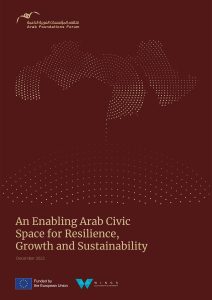Multiple crises and contextual complexities – a protracted refugee crisis, a health crisis, an economic downturn due to the pandemic, and food insecurity triggered by the Russian-Ukraine war – have placed mounting pressures on civil society to respond to external pressures and address uncertainty while navigating a complex civic space. While the latter has undergone change in some areas, it has remained persistently insulated from change in others.
 Capturing these dynamics has been the scope of the Arab Foundations Forum study on ‘An Enabling Arab Civic Space For Resilience, Growth And Sustainability’ that maps changes in the legal, policy and infrastructure in four Arab countries – Egypt, Jordan, Lebanon and Palestine – and its effect on the practices of Arab philanthropy and CSOs in a pandemic and post-pandemic context. The study methodology has placed emphasis on amplifying local voices through interviews with 23 civic actors with diverse backgrounds – foundations, associations, FBOs, donors, infrastructure support organizations and specialists – and tapping on local knowledge and research to understand the dynamics of change and areas for reform.
Capturing these dynamics has been the scope of the Arab Foundations Forum study on ‘An Enabling Arab Civic Space For Resilience, Growth And Sustainability’ that maps changes in the legal, policy and infrastructure in four Arab countries – Egypt, Jordan, Lebanon and Palestine – and its effect on the practices of Arab philanthropy and CSOs in a pandemic and post-pandemic context. The study methodology has placed emphasis on amplifying local voices through interviews with 23 civic actors with diverse backgrounds – foundations, associations, FBOs, donors, infrastructure support organizations and specialists – and tapping on local knowledge and research to understand the dynamics of change and areas for reform.
Some key takeaways from the study include:
The civic space has a strong mediating effect on civil society growth.
While this might not be new to some civil society observers, nonetheless the data shows a correlation between civic space openness/closeness and the growth of registered civil society organizations. The role of the Arab Spring is one notable example provided by the study where there has been a mushrooming of registered civic activity. The study also makes the link between the introduction of restrictive laws and registered civic activity.
In Egypt, for instance, the introduction of a controversial association law in 2017 has resulted in a decline in the size of registered CSOs. While Law 70 of 2017 has been replaced by a new and more relaxed association law (Law 149 of 2019), nonetheless, civic actors in the four countries would agree that the discretionary banking practices and the application of regulations influencing access to international funding are the biggest constraints faced.
The flexible funding practices of donors and Arab philanthropy during the Covid-19 crisis have supported civil society agility and responsiveness to communities in need.
While far from being widespread, the evidence shows that flexible donor practices have empowered CSOs to swiftly respond to beneficiaries and sustain their operations during shifting needs. Flexible practices varied from allowing CSOs to allocate budget lines towards emergency response and identified needs on the ground, extending grant timelines or issuing emergency response request for proposals (RFPs) for grantees. Examples of the latter include the Sawiris Foundation in Egypt and the Arab Council for Children and Development RFPs in emergency response to Covid-19. The Shabake project – a 2.5 year institutional capacity development initiative for local CSOs funded by Agence France in Lebanon – is another model for flexible funding that enabled CSO beneficiaries to determine their own needs, which included multi-purpose cash assistance schemes, support of elderly, and psychological first aid support to name some.
Building civil society organization resilience and long-term capacities is intrinsic to recovery in the region.
The lack of adequate social protection systems for the poor and the disadvantaged has pushed civil society in the four countries to play an important role in bridging persistent gaps in service provision. For instance, in the four countries alike, philanthropically-funded hospitals and civil society-run healthcare services are common. In Palestine and Lebanon, civil society often resumes the role of the state as a service provider in certain sub-sectors.
With growing inequity gaps in the region surfacing, civil society institutional capacities are put under significant strain. Against this backdrop, civic actors have underscored the importance of building sustainable local institutional capacities and not simply programmatic for economic and social recovery in the region. Building reserves, organizational development and retaining staff are key priorities for this to happen. Developing organizations’ learning and adaptive capacities is another key area highlighted, as CSOs will need to learn to shift programmatic responses based on the stage of the crisis and recovery cycle.
Additionally, the tension between humanitarian relief and transformational agenda of civil society was highlighted, as donor and philanthropic support to relief can often overtake the sustainable development work of civil society. The study gives the example of the inadequate shelter, heating fuel and energy shortages experienced on a yearly basis by refugees in Lebanese camps[1]. The lack of concrete housing solutions reflects this imbalance between relief support and sustainable development solutions.
The unequal power dynamics in the donor-grantee relationship is a commonly held concern of civic actors that reinforces dependency and curtails localization efforts.
The study provides insights on the chronic challenge of civil society donor dependency in Jordan, Lebanon and Palestine, and to a lesser extent Egypt. The latter has a more diverse funding landscape where the big public foundations and charitable organizations have nationwide access to religious-inspired giving while community-based organizations tap on wealthy community members (e.g. local businessmen and diaspora). It is strongly suggested that persistent donor practices such as criteria for awarding contracts that favor the larger and more resourced organizations, the limited investment in core and unrestricted funding and excessive reporting practices by donors excludes a wide base of civil society organizations from building institutional capacities and accessing finance. The uneven application of the localization agenda is a big issue that infrastructure support organizations are tackling heads on to pave the way for more local ownership of the development agenda and build a more supportive ecosystem. For instance, the lack of meaningful representation of CSOs in key strategic decision-making structures on local aid and donor national strategy formulation was cited as a key bottleneck. The overstretched capacities and somewhat limited commitment of CSOs to develop and diversify their income sources is another problem the study underscored.
Moving forward, the report concludes that advocating for system change towards a more enabling environment for Arab philanthropy and civil society entails sustained and incremental evidence generation, collective advocacy and addressing the chronic gap of civil society finance sustainability. Towards this end, what the report aims to do is to serve as an evidence-based tool that devises priorities and areas of action for collective advocacy by the sector for a more enabling environment.
The report launched in a webinar event on 1 December with the participation of global and regional philanthropic and civil society actors can be accessed here. This publication was produced with the financial support of WINGS and the European Union.






Comments (0)